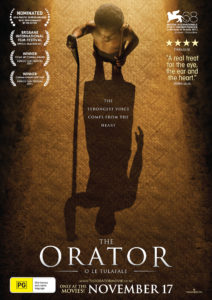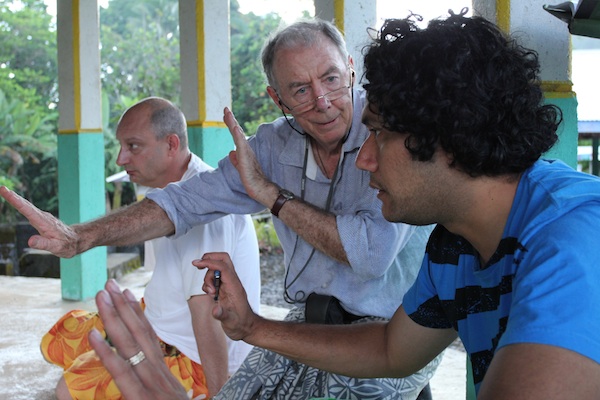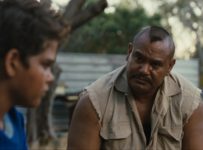 Selected by New Zealand as the official entry for Best Foreign Language Film at the 84th Academy Awards, the first time New Zealand has entered a film into this category, Tusi Tamasese’s The Orator has already made history as the first Samoan language film to be shot in Samoa with a Samoan cast and crew. The first-time director never expected it to be this big. “I just wanted to make a film. When you’re in the film industry, you always dream of reaching certain marks, but I never thought that it would come to where it is. So I’m quite humbled”.
Selected by New Zealand as the official entry for Best Foreign Language Film at the 84th Academy Awards, the first time New Zealand has entered a film into this category, Tusi Tamasese’s The Orator has already made history as the first Samoan language film to be shot in Samoa with a Samoan cast and crew. The first-time director never expected it to be this big. “I just wanted to make a film. When you’re in the film industry, you always dream of reaching certain marks, but I never thought that it would come to where it is. So I’m quite humbled”.
The Orator is an attempt to portray Samoan culture as it is, using an observational approach to dictate the pace. The main character, Saili (Fa’afiaula Sagote), a simple villager, and a dwarf taro-farmer. He must overcome his physical restrictions in a culture that is not only run by the most masculine of men, but where the oral tradition makes it essential that he find a voice in order to fight for what is rightfully his. In order to do so, he must reclaim his chiefly status.
The journey began for Tusi when he was still studying for his Masters degree in New Zealand. “I had written some stuff,” he explains “and I didn’t really like them but the things that were in common with all of my scripts, the first versions, they were all dealing with a chief and death as well. There was always a mention of death, and there was always the culture. So I picked up the chief and I started to question it. Why am I always so interested in this? So when I finally found my idea of the chief, I found my main character. Everything else seems to really fall into place. That was 2007 when I wrote the script, and we finished post-production this year”.
The observational approach comes from a number of places, not least of which is Tusi’s love of Japanese cinema. “The one that I was most attracted to was the Japanese, like Ozu and Kurosawa. The culture I saw it as very similar to Samoan culture. They sit down on the ground, and the way they sit is very precise and still. This is a style I thought I needed to understand a bit more. So I tried to find a way to be authentic, to try and copy, but try and find how I can get into the culture and shoot it from inside”. Much like those masters, for Tusi it was all about the positioning of the camera: “I love shadows and I love gloomy stuff, because it helps…contribute to the story as well. I spoke to my DOP and told him about the shadows, and I told him I wanted to capture the change in data, you know the transition”.
The writing process is one thing, but shooting the first film in Samoa is not without its difficulties. The terrain was difficult, and as can be seen from the behind the scenes footage of the shoot, the terrain was incredibly wet. Tusi was not quite prepare for how wet it would be: “On our first week we had floods, and we almost got stuck in making our way back to the hotel. The rivers were overflowing and the cars were stuck. The weather was challenging. When [the crew] came over , the heat was very, very relentless, and standing in the sun trying to get a shot was, you know, I could understand the stressfulness that they were facing. That and mosquitos. Having that weather sort of helped us, gave us more encouragement than traditional shoots”.
Yet the local villagers were more than accommodating to the camera crew “I felt sorry for the village. We sort of disrupted people’s daily routine, but they were very accommodating. They went out of their way to help. When we were shooting, someone would stand in the middle of the village and shout out ‘Quiet please!'”.
Yet it was within these disrupted lives that they found most of the cast of the film. In casting the crucial role of Saili, luck played a part when the original choice for the role didn’t work out. “We got very lucky that this woman rang up from another island…and she said just down the road there’s a small person there. So we went there, and there he was, just sitting there”.
Despite the reception that the film has received, including winning the CICAE Art Cinema Award at the Venice International Film Festival, Tusi has more humble hopes for the audience. “Hopefully they just like the film. I think it’s just a little bit of an insight into the richness that is in the Pacific. It’s not just, I stayed away from showing the paradise side, the postcard side. I wanted to go deep and see that there’s a rich culture in the land”.
He also plans to stay in the film industry, despite some initial reluctance. “Right after the shoot I said to myself, that’s it for me. It’s too much. But you come and you look at it, and it’s the sort of experience that you’re proud of. All the hardship and all the crap you came up against, I should be honoured to experience that and privileged, so the fire is still going again”.
The Orator was released in Australia on 17 November 2011 from Transmission.






hey this movie’s great so that’s what I hear yet I still have not seen it yet because our pastor told my parents that it’s not a good movie wow ! not your problemo but anywayz looks like I Got to find some way to eventually watch out 🙂 lol
watch it 🙂 lol spelt it wrng -.-